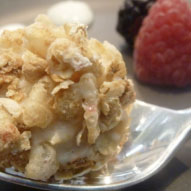Three UW-Madison teams will compete in national food product contests this weekend
They spent most of the past year inventing a shelf-stable yogurt truffle, a beverage mix made with real fruit and a tangerine-flavored carbonated dairy beverage drink.
Now three teams of UW–Madison students are headed to New Orleans to see how their ideas fare in the final rounds of two national food product development competitions being held at the Institute of Food Technologists (IFT) annual meeting this weekend.

Blissful Bites
One UW–Madison team will take samples of Blissful Bites — a yogurt truffle with a vanilla yogurt center, yogurt-flavored coating and crunchy outer layer of flax, oats and puffed rice — to compete against five other schools in the finals of the IFT’s collegiate product development competition.
Two other UW–Madison product-development teams will compete in a Disney-sponsored competition to create healthy foods for kids. At the Disney finals, a team of UW–Madison undergraduates will showcase a carbonated beverage, called Tangerine Dream, that contains a full serving of low-fat dairy and tastes something like an orange creamsicle. Another UW–Madison team, this one composed of graduate students, will compete with Pixie Dust, a powdered drink mix made from real fruit that can be added to milk or water.
Having three teams from one school is a big deal, says Jackie Koch, captain of the graduate student team, who also serves as product development chair for the Food Science Club.
“It’s completely new that there are two teams from one school that made it to the finals in the same competition,” Koch says. Likewise, it’s unheard of that a school has three teams competing overall.
For each team, the path to New Orleans began in the fall with brainstorming, followed by many hours in the kitchen perfecting their recipes, then many more developing a proposal with plans to manufacture, distribute and market the products. After finding out they’d made the cut (each contest had about two dozen original entrants, and six finalists) the teams expanded their proposals and started preparing their presentations for the finals.
Success in these contests can hinge on early decisions. In choosing a product to develop last fall, the Blissful Bites team kept in mind that judges reward groups that encounter and solve technical challenges. So they passed on simpler ideas, opting instead to try to turn yogurt, a perishable food, into a shelf-stable snack.
“We figured there would be more technical problems to solve along the way,” says team co-captain Amy DeJong, a senior majoring in food science. And they were right. It took a lot of work to get the moisture level of the yogurt just right — dry enough to prevent mold, moist enough to form it into balls.
The Pixie Dust team took a different tack, searching for unfilled niches among existing products. What they found surprised them: There were plenty of powdered drink mixes, but none made of real, dehydrated fruit. “It’s actually a very easy thing to make, but it’s not out there,” says Koch.
They envision marketing Pixie Dust in single-serving pouches, like Crystal Light, targeted at the elementary school cafeteria set. “You can put something that’s the equivalent of a serving of raspberries or a serving of apples into a school milk,” says Koch. “And it’s only 40 calories.”
Pixie Dust, Tangerine Dream or Blissful Bites just might end up on grocery shelves. Over the years, food companies have turned a number of student-made products showcased at the IFT finals into real products.
“Usually a few hundred people come to watch the oral presentations,” says Koch. “They are really excited about new products, which makes it exciting to present your product and show it to the food science world.”
Results of the two competitions will be announced during an evening ceremony on June 13.




